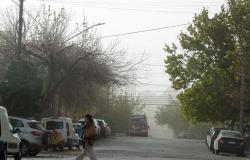Walk to the facu. The dog at the door. Show the notebook, the documents. Go to class. Maybe (maybe) some questions. Dark environment. Walls painted white. An Opus Dei priest as dean. No sign. No call. No meeting. Banned here. Banned there. 70’s’. People could not get together (as Bullrich’s current DNU now states). He went to college to study, they said.
Well, it turns out that one of those days he arrived at the door. He is busy with I don’t know what. In a hurry, I keep going. And then. The Scream. The order. The accident. Mister! Come here! And the guy who tells me everything – bad, very bad – because I dared to enter my class without showing the documents. Door closed. Terror. The violence contained in that event shakes me even today. And yet, however strange it may be read or heard, such a record is an achievement. It took me years to open the door of trauma. The fact is that the naturalization of abuse was so enormous that it was difficult to take a real dimension of it. Which, of course, does not mean that it did not produce effects. In fact, I was only able to return to the University with the return of democracy. Someone could say: what you are saying is insignificant compared to the state terrorism that disappeared thirty thousand people and stole the identity of hundreds of boys and girls. But it would be a mistake. Because it is not one without the other. The explicit violence of the security forces (from demanding documents at a university to repression in the streets) announces, unmasks or proves illegal practices and crimes against humanity in the making or already committed clandestinely.
This is the path that events in our country are taking today. The attack on culture and the institutions that feed and sustain it, such as the University, proves this. It is essential for the impoverishing, maddening and authoritarian project that today inhabits the Casa Rosada to undermine the symbolic framework that sustains our country as a sovereign nation. Close the door. Naturalizing the aberrant is the substantial step of all tyranny. From this point of view, we could well say that culture, art and education take refuge in the sensitivity through which a community puts a barrier to barbarism. For months now, many of us have been wondering what to do in the face of a deranged company willing to erase the limits with which the rule of law guarantees civilized coexistence. There are answers. To start: talk. If the tyrant instills fear and terror, it becomes essential: to speak. The word has unexpected effects when the person who utters it differentiates itself from the stereotypical rumination of comfort and cowardice. Yes, as Lacan says: “The door is a true symbol, the symbol par excellence”[1]it is necessary to speak.
“I’m not going to allow him.”
A few hours ago I had to act as a Jury in a competitive examination for a teaching position at the National University of Comahue. A very strong, very intense experience. A public event. Applicants with excellent background. Years of experience. A lot of commitment in teaching. Research projects. Extensive participation in community outreach programs. I was lucky. In the formation of the jury I had brilliant and very committed colleagues who helped me cope with the inexplicable weight and burden that I experienced in the task until a certain moment. I mean: waking up at four in the morning to read a teacher’s resume (a document!) for the fifth time is not so common. Because? What was operating so that such energy was present in the performance of this function? As often happens, the more intense the passion and pain that passes through us, the more reluctant the cause is to make itself noticed. The truth is that it was not until a few minutes before the start of the contest that the click appeared: the articulation that made visible the trauma by which one more act of university life took on such particular significance and value for those who signed it.
To say it once and for all: in these hours the National University of Comahue is not just another one. It is the house of higher education whose rector put into words what so many of us are experiencing since the libertarian monstrosity that governs us launched its plan to exterminate the public University, the culture, the word and all knowledge that the bodies generate in the hard experience of responding to the demands that existence imposes. Whoever can see the video in which, during an inter-university conclave at Unsam, Rector Beatriz Gentile responds to the bureaucrat on duty for her bravado of contempt for the academic field. But it was only a few minutes after the contest began that her words resonated clearly in my memory to, in this way, make vivid that entire experience of terror and humiliation at the door of the University.
“I cannot allow you, Mr. Undersecretary,” said Beatriz Gentile to the Undersecretary of University Policies of the Nation when he tried, precisely, to defend the practice of requesting documents from official organizations. On the other hand, in his regrettable and violent intervention, the official had outlined a decadent scenario for the Argentine university, in addition to insinuating that the rectors of the universities were usurping their positions. The truth is that, among several other issues, and after reminding her that her status as Rector arose from an election while the undersecretary held a position by decision of the management (read by finger), Beatriz Gentile perhaps offered something similar to a class public. “Historical exercise through”, she let the bureaucrat know that the University can only grow if there is an expanding society. To do so, it was enough to record the figures for the growth of university enrollment during governments that prioritized the well-being of the population in contrast to administrations that made “praetorianism” their mode of government. The Rector was a university student, open, she articulated the academy with the street; knowledge with speech; the word with the bodies.
Next April 23, the University Speaks. Open the doors. He returns to the streets to teach, to prevent the naturalization of barbarism, and to let the ruling obscurantism know that there is a community willing to face the infamous project of exterminating Argentine culture. “We are not going to allow it.”
Sergio Zabalza is a psychoanalyst. Doctor in Psychology from the University of Buenos Aires. Master in Psychoanalytic Clinic (UNSAM), Bachelor in Psychology (UBA). Full Professor at the National University of Chaco Austral (UNCAUS).
[1] Jacques Lacan, (1954-1955) The Seminar: Book 2 “The Ego in Freud’s Theory and Psychoanalytic Technique”, Buenos Aires, Paidós, 1998, p. 446.






